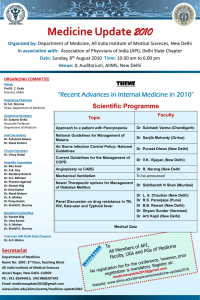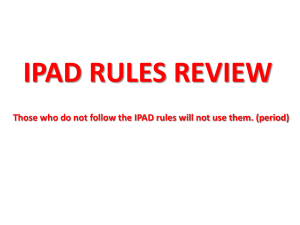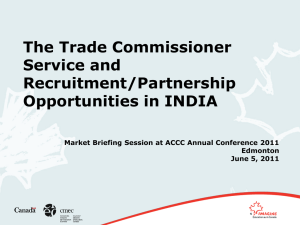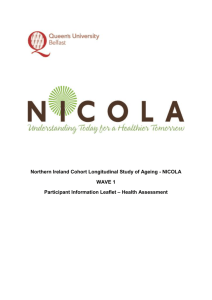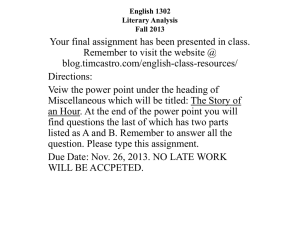nicola_pitchford_session_8
advertisement
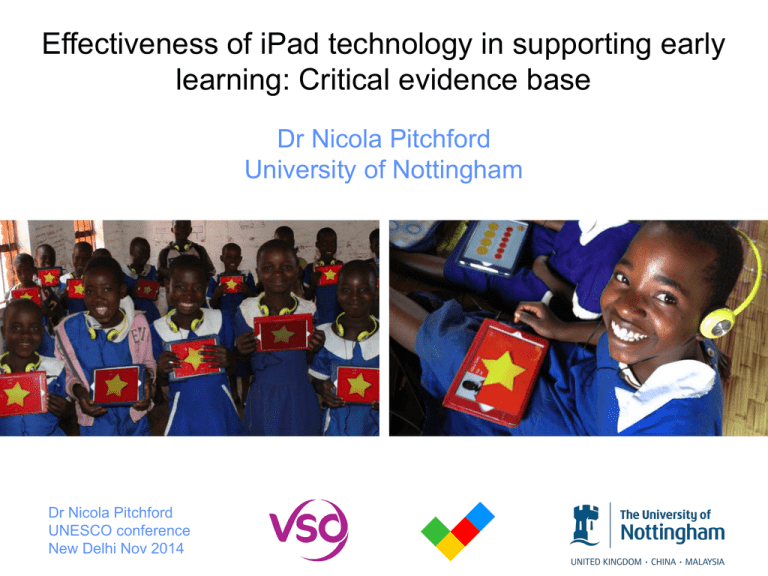
Effectiveness of iPad technology in supporting early learning: Critical evidence base Dr Nicola Pitchford University of Nottingham Dr Nicola Pitchford UNESCO conference New Delhi Nov 2014 Global education crisis • Many countries around the world require urgent education reform • Developing countries are in particular need E.G. Malawi • Very poor standards • 98% of pupils have only basic numeracy • Girls drop out of primary education early • Overcrowded & under-resourced classes • Poorly trained teachers • Short school days (e.g. 07.30-10.30) UNESCO-IBE World Data on Education Report (2010) Dr Nicola Pitchford UNESCO conference New Delhi Nov 2014 Global education crisis • Greater impact on vulnerable children • Girls (developing countries) • Children from areas of high social deprivation • Children with English as an Additional Language (EAL) • Children ‘at risk’ of, or with diagnosed, learning difficulties Dr Nicola Pitchford UNESCO conference New Delhi Nov 2014 Can technology offer an innovative solution? • Digital technologies, such as iPads, can offer: Intervention • Child-centred individualised tuition • Consistent quality for all children • Delivery of well-designed software • Content grounded in a solid well-constructed curriculum • One-to-one interactive instruction with clear objectives • Material that can be repeated as often as need be Assessment • Monitoring of individual progress through objective assessments • Identification of children with special educational needs Dr Nicola Pitchford UNESCO conference New Delhi Nov 2014 How effective are iPads in supporting learning? • Rigorous evaluation is required prior to roll out Intervention • ‘onebillion’ maths intervention with ‘oneclass’ technology • RCT at Biwi primary school, Malawi (400 S1-4), 8 weeks • Cross-over study at Dunkirk Primary School, UK (61 EYFS), 6 weeks Assessment • New app for assessing basic skills underpinning scholastic progression • Grounded in developmental neuropsychology • Enables identification of children ‘at risk’ of learning difficulties • Profiling of relative strengths and weaknesses Dr Nicola Pitchford UNESCO conference New Delhi Nov 2014 Intervention • onebillion software delivered on Apple iPads • 4 apps based on National Primary Curriculum • Teach core mathematical concepts • Delivered in local language, Chichewa/English • Quiz to assess knowledge at end of each set of activities • Automatic, solar, digital recording of children’s progress with ‘oneclass’ technology • Robust hardware, easy to use, interactive technology • Long battery life Dr Nicola Pitchford UNESCO conference New Delhi Nov 2014 Assessment • New app delivered on Apple iPads • Basic skills • Maths curriculum knowledge • Mathematical concepts • Delivered pre and post intervention • Reliable and valid • Generalisation to different format (Malawi) • Sustainability over time (UK) Dr Nicola Pitchford UNESCO conference New Delhi Nov 2014 Key findings • onebillion iPad intervention is significantly more effective at improving mathematical attainment than current pedagogical practice for primary school children in both Malawi and the UK • Similar learning gains across countries 1 week iPad intervention = 3 months standard pedagogical practice Dr Nicola Pitchford UNESCO conference New Delhi Nov 2014 Malawi data Key findings • Vulnerable children respond especially well to the intervention • Girls learning gains were similar to boys (Malawi) • Children from high social deprivation showed similar learning gains to children from more privileged homes (UK) • Children with EAL made greater learning gains than non-EAL children – ‘closing the gap’ in knowledge (UK) • 78% of children ‘at risk’ of learning difficulties (10% of total sample) at pre test significantly improved their maths knowledge to within the normal range at post test (Malawi) • Generalises to different formats (Malawi) • Sustainable over time (UK) Dr Nicola Pitchford UNESCO conference New Delhi Nov 2014 Conclusions • Combining iPad technology with innovative, interactive, curriculum-based software, is a highly effective means of providing inclusive, child-centred, learning to primary school children around the globe • It is particularly useful for vulnerable children ‘at risk’ of learning difficulties • iPad technology can also be used effectively to assess basic and scholastic skills in an objective, reliable, and valid manner • With a full range of accessibility features built in as standard iPad technology that can be exploited to support the needs of all learners, in any context worldwide (schools, hospitals, remote villages etc) Dr Nicola Pitchford UNESCO conference New Delhi Nov 2014 Implications for policy and practice • Technology needs to carefully embedded within the educational system, so as to maximise confidence and usage by teachers • Requires educational reform to achieve effective and sustainable implementation at a nationwide scale • Scientists need to work in partnership with governments, educators, charities, IT businesses, NGOs and other organisations for the full potential to be realised Dr Nicola Pitchford UNESCO conference New Delhi Nov 2014 Thanks and appreciation onebilion Andrew Ashe (CEO) Jamie Stuart (Chief Programmer) Michal Safier (Programmer) Alexandra Turner (Translator) EuroTalk Richard Howeson (Chairman) VSO Malawi Dario Gentili (Country Director) Frederick Gaghauna (Technical Support) Malawi Ministry of Education Anjimile Oponyo (Principal Secretary for Basic & Secondary Education) Raphael Agabu (Director of Inspectorate for Schools) Henry Mphiningo (Primary Education Advisor Area 36) Kumbali Lodge, Lilongwe Guy and Maureen Pickering (Proprietors) Special thanks to Guy for building the Biwi Learning Centre Scottish Government For funding this study Laura Outhwaite Running the Dunkirk Primary School Study Biwi Primary School & Dunkirk Primary School All of the staff and children who were a joy to work with Dr Nicola Pitchford UNESCO conference New Delhi Nov 2014 Further information https://onebillion.org.uk/ http://www.bbc.co.uk/news/technology-29063614 http://journal.frontiersin.org/ResearchTopic/2611 Using technology to revolutionise learning: Assessment, intervention, evaluation and historical perspectives nicola.pitchford@nottingham.ac.uk Dr Nicola Pitchford UNESCO conference New Delhi Nov 2014
